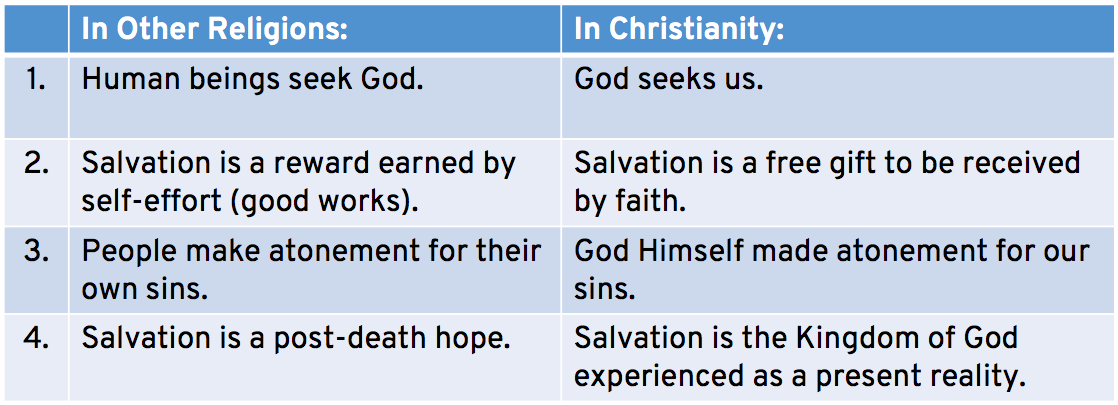“Don’t all religions teach the same thing?” and other questions you’d really like to ask
Then Chee Min // May 22, 2019, 6:29 pm

Photo by Jeremy Perkins on Unsplash.
As a new believer, you might have a lot of questions about Jesus, church, traditional customs, even science.
The Bible has many examples of people who struggled with doubt – even faith heroes like David, John the Baptist and Abraham.
But instead of yielding to doubt or rejecting God, they came to a deeper understanding of God’s character and goodness (Psalm 13:5-6) when they honestly sought answers.
In fact, the Bible invites you to ask questions: “If any of you lacks wisdom, let him ask God, who gives generously to all without reproach, and it will be given him.” (James 1:5)
So go ahead – ask what’s on your heart and mind. There are four main reliable sources where you can find your answers:
- God’s Word (2 Timothy 3:16-17)
- Prayer (Jeremiah 33:3)
- Christian leaders and mature Christians (Psalm 37:30)
- Bible-based courses such as Rhema, Alpha, Disciple, and BSF (Bible Study Fellowship).
Here are some frequently asked questions you might have. The answers are not meant to be comprehensive, but to facilitate discussion in your church or Bible study group.
Don’t all religions teach the same thing?
While it is true that all religions have moral teachings, it does not necessarily mean that all religions are similar or teach the same thing.
Living things are not all the same simply because they share the characteristic of being composed of 75-90% water.
Christianity is different from other religions in four very important aspects:

Why do we need to pray if God already knows what we need before we even ask Him?
Jesus said: “Your Father knows what you need before you ask Him” (Matthew 6:8). But He never implied that asking God to meet our needs in prayer is unnecessary.
The real question is not whether God can meet our needs without our asking. He can and He does.
Jesus himself said: “God causes his sun to rise on the evil and the good, and sends rain on the righteous and the unrighteous” (Matthew 5:45), implying that He takes care of the needs of even those who disregard Him.
The real question then is why does He want us to ask?
God invites His children to present our requests before Him in prayer: “Until now you have not asked for anything in my name. Ask and you will receive and your joy will be complete”. (John 16:24)
In this case, the reason for asking is joy.
God wants us to have a happy relationship with him. He wants us to enjoy His love so He delights in answering our prayer as a demonstration of His love.
God wants us to build a relationship of trust with Him.
Asking and receiving is the basis for building that relationship of trust, which is the heart of biblical faith.
I am basically good. I don’t harm others. Why does Jesus Christ need to die for me?
Sin is not just doing wrong. The Bible defines sin as the rejection of God’s rule over our lives (Romans 1:21).
For many, the darkening of the human hearts also results in evil and immoral thoughts, words and deeds that are inconsistent with God’s holy and loving nature.
Sin is not just an act but also an attitude. For example, in Matthew 5:21-22, Jesus equated anger with murder because the heart attitude that results in murderous acts is anger.
Similarly, in Matthew 5:27-28, Jesus equated lustful thoughts with adultery.
Even if we have never committed murder, robbery or adultery, we would have been equally guilty of these sins if there is anger, covetousness or lust in our heart.
That is why the Bible says that “all have sinned and fall short of the glory of God” because all of us have attitudes and thoughts that often fall short of God’s holy standards as given in the Ten Commandments (Exodus 20:1-17).
We can understand sin as a violation of natural laws that leads to destruction.
For example, the law of gravity is a natural law.
It does not matter if you believe in gravity or not; if you violate the law of gravity by jumping off a high-rise flat without a parachute, you will suffer the destructive consequences.
In the same way, sin is the violation of God’s moral and spiritual laws.
God’s laws are given to protect us so that we can lead a fulfilled life. However, when we choose to violate God’s laws as contained in the Bible (whether we believe them or not), we will suffer the destructive consequences of that violation.
Hasn’t Science proven that God doesn’t exist?
Science cannot prove God exists any more than Science can prove love exists.
Science deals with material reality that is measurable, but when we talk about God, we are discussing super-materiality.
All the tools of Science measure material things – under the microscope, through the telescope, or using whatever scopes scientists may have in their toolbox.
Even invisible things like gravity and radio waves can be measured.
Whatever Science cannot measure, Science has no right to make any categorical statement about.
While Science can measure the neurological activity of the brain, and can even use it to operate a computer by just thinking about it with their brain, scientists have yet to figure out how the mind can think apart from brain activity.
But we know in practice that the mind thinks and the brain responds – the responses of the brain can be deterred by electrodes.
Despite all the recent advances in brain science, scientists are still debating if the mind is just an illusion created by brain activity or whether there is a separate entity called “the mind” that is independent of brain activity.
“Proof of Heaven: A neurosurgeon’s journey into the afterlife” was written by Dr Eben Alexander whose initial scepticism about near-death experiences was challenged when he suffered a rare brain infection that resulted in brain death.
Yet, Dr Alexander came back to relate a reality that is beyond brain death.
When scientists pontificate about the supernatural and super-material realms, they are not making scientific statements but philosophical ones.
These are often statements of faith, not statements of fact.
When scientists like Stephen Hawking and Richard Dawkins declare there is no God, they are not making scientific statements.
They might as well declare that the human mind doesn’t exist. In that case, their statements are statements of faith, not scientific fact.
This article was adapted from “Frequently asked questions about Christianity”, published by Genesis Books, and is republished with permission.
We are an independent, non-profit organisation that relies on the generosity of our readers, such as yourself, to continue serving the kingdom. Every dollar donated goes directly back into our editorial coverage.
Would you consider partnering with us in our kingdom work by supporting us financially, either as a one-off donation, or a recurring pledge?
Support Salt&Light




